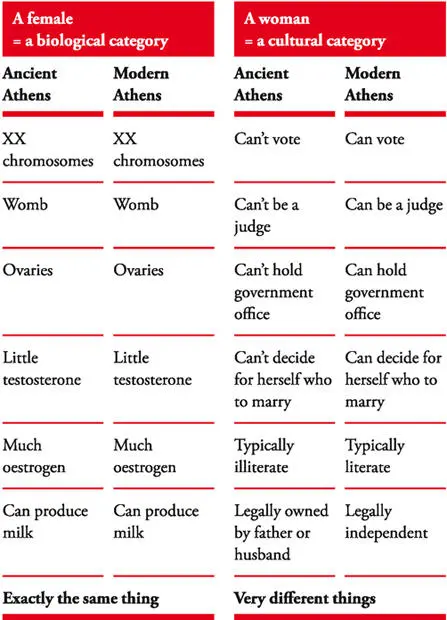Culture tends to argue that it forbids only that which is unnatural. But from a biological perspective, nothing is unnatural. Whatever is possible is by definition also natural. A truly unnatural behaviour, one that goes against the laws of nature, simply cannot exist, so it would need no prohibition. No culture has ever bothered to forbid men to photosynthesise, women to run faster than the speed of light, or negatively charged electrons to be attracted to each other.
In truth, our concepts ‘natural’ and unnatural’ are taken not from biology, but from Christian theology. The theological meaning of ‘natural’ is ‘in accordance with the intentions of the God who created nature’. Christian theologians argued that God created the human body, intending each limb and organ to serve a particular purpose. If we use our limbs and organs for the purpose envisioned by God, then it is a natural activity. To use them differently than God intends is unnatural. But evolution has no purpose. Organs have not evolved with a purpose, and the way they are used is in constant flux. There is not a single organ in the human body that only does the job its prototype did when it first appeared hundreds of millions of years ago. Organs evolve to perform a particular function, but once they exist, they can be adapted for other usages as well. Mouths, for example, appeared because the earliest multicellular organisms needed a way to take nutrients into their bodies. We still use our mouths for that purpose, but we also use them to kiss, speak and, if we are Rambo, to pull the pins out of hand grenades. Are any of these uses unnatural simply because our worm-like ancestors 600 million years ago didn’t do those things with their mouths?
Similarly, wings didn’t suddenly appear in all their aerodynamic glory. They developed from organs that served another purpose. According to one theory, insect wings evolved millions of years ago from body protrusions on flightless bugs. Bugs with bumps had a larger surface area than those without bumps, and this enabled them to absorb more sunlight and thus stay warmer. In a slow evolutionary process, these solar heaters grew larger. The same structure that was good for maximum sunlight absorption – lots of surface area, little weight – also, by coincidence, gave the insects a bit of a lift when they skipped and jumped. Those with bigger protrusions could skip and jump farther. Some insects started using the things to glide, and from there it was a small step to wings that could actually propel the bug through the air. Next time a mosquito buzzes in your ear, accuse her of unnatural behaviour. If she were well behaved and content with what God gave her, she’d use her wings only as solar panels.
The same sort of multitasking applies to our sexual organs and behaviour. Sex first evolved for procreation and courtship rituals as a way of sizing up the fitness of a potential mate. But many animals now put both to use for a multitude of social purposes that have little to do with creating little copies of themselves. Chimpanzees, for example, use sex to cement political alliances, establish intimacy and defuse tensions. Is that unnatural?
Sex and Gender
There is little sense, then, in arguing that the natural function of women is to give birth, or that homosexuality is unnatural. Most of the laws, norms, rights and obligations that define manhood and womanhood reflect human imagination more than biological reality.
Biologically, humans are divided into males and females. A male Homo sapiens is one who has one X chromosome and one Y chromosome; a female is one with two Xs. But ‘man’ and woman’ name social, not biological, categories. While in the great majority of cases in most human societies men are males and women are females, the social terms carry a lot of baggage that has only a tenuous, if any, relationship to the biological terms. A man is not a Sapiens with particular biological qualities such as XY chromosomes, testicles and lots of testosterone. Rather, he fits into a particular slot in his society’s imagined human order. His culture’s myths assign him particular masculine roles (like engaging in politics), rights (like voting) and duties (like military service). Likewise, a woman is not a Sapiens with two X chromosomes, a womb and plenty of oestrogen. Rather, she is a female member of an imagined human order. The myths of her society assign her unique feminine roles (raising children), rights (protection against violence) and duties (obedience to her husband). Since myths, rather than biology, define the roles, rights and duties of men and women, the meaning of ‘manhood’ and ‘womanhood’ have varied immensely from one society to another.


22. Eighteenth-century masculinity: an official portrait of King Louis XIV of France. Note the long wig, stockings, high-heeled shoes, dancers posture – and huge sword. In contemporary Europe, all these (except for the sword) would be considered marks of effeminacy. But in his time Louis was a European paragon of manhood and virility.

23. Twenty-first-century masculinity: an official portrait of Barack Obama. What happened to the wig, stockings, high heels – and sword? Dominant men have never looked so dull and dreary as they do today. During most of history, dominant men have been colourful and flamboyant, such as American Indian chiefs with their feathered headdresses and Hindu maharajas decked out in silks and diamonds. Throughout the animal kingdom males tend to be more colourful and accessorised than females – think of peacocks’ tails and lions’ manes.
To make things less confusing, scholars usually distinguish between ‘sex’, which is a biological category, and ‘gender’, a cultural category. Sex is divided between males and females, and the qualities of this division are objective and have remained constant throughout history. Gender is divided between men and women (and some cultures recognise other categories). So-called ‘masculine’ and ‘feminine’ qualities are inter-subjective and undergo constant changes. For example, there are far-reaching differences in the behaviour, desires, dress and even body posture expected from women in classical Athens and women in modern Athens. 6
Sex is child’s play; but gender is serious business. To get to be a member of the male sex is the simplest thing in the world. You just need to be born with an X and a Y chromosome. To get to be a female is equally simple. A pair of X chromosomes will do it. In contrast, becoming a man or a woman is a very complicated and demanding undertaking. Since most masculine and feminine qualities are cultural rather than biological, no society automatically crowns each male a man, or every female a woman. Nor are these titles laurels that can be rested on once they are acquired. Males must prove their masculinity constantly, throughout their lives, from cradle to grave, in an endless series of rites and performances. And a woman’s work is never done – she must continually convince herself and others that she is feminine enough.
Success is not guaranteed. Males in particular live in constant dread of losing their claim to manhood. Throughout history, males have been willing to risk and even sacrifice their lives, just so that people will say ‘He’s a real man!’
Читать дальше






![Юваль Ной Харари - Sapiens. Краткая история человечества [litres]](/books/34310/yuval-noj-harari-sapiens-kratkaya-istoriya-cheloveche-thumb.webp)





![Юваль Ной Харари - 21 урок для XXI века [Версия с комментированными отличиями перевода]](/books/412481/yuval-noj-harari-21-urok-dlya-xxi-veka-versiya-s-ko-thumb.webp)


